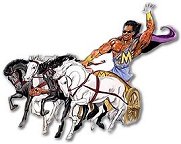|
Pegasus was the beloved winged horse of Greek mythology that
sprang out of his mother Medusa's head when the great hero Perseus
decapitated the Gorgon. His brother Chrysaor was born at the same
time from Medusa's severed head.
Another version of their birth holds that, when Perseus beheaded
Medusa, the Gorgon's blood falling on the Earth gave birth to
them. Another variation states that they were formed from a
cocktail of Medusa's blood, pain and sea foam, much like the
goddess Aphrodite's birth.
The immortal flying horse was fathered by the sea deity Poseidon,
who, in his role as a god of horses, consorted with the
then-beautiful maiden, the gorgon Medusa to sire Pegasus. He is
usually depicted as a white stallion.
Pegasus' name means either "of the spring" from the Greek word pêgê,
or "sprung forth" from the word pêgazô.
The first version alludes to the flying horse's connection with
various springs, and the latter to his birth from the Gorgon's
neck.
Following his dramatic birth, he assented to Mount Olympus, home
of the Olympian gods, where he served the King of the Olympians,
Zeus, by retrieving his thunderbolts and lightning on command. On
those occasions, the hooves of Pegasus could be heard thundering
across the sky in a storm.
Some later accounts state that Pegasus became the occasional mount of Eos,
goddess of the Dawn. She would ride the winged steed on her
mission to bring forth the Dawn. At other times he would be ridden
by Apollo as he brought the sun across the sky.
A favourite of the Nine Muses, who loved to ride and frolic with
him, Pegasus caused to gush forth the fountain of Hippocrene
(Horse Spring), on Mount Helicon, home of the Muses. Early myths
say that everywhere the winged stallion struck his hoof to earth,
wonderfully refreshing springs would burst forth.
The fountain Hippocrene was alleged to have been commanded at the
behest of Poseidon, in order to prevent Mount Helicon from
swelling with rupture and causing flooding whenever the Muses
sang.
The story goes like this: The Nine Muses once engaged in a singing
contest with the vain daughters of Pierus on Mount Helicon. As the
daughters of Pierus began to sing, all around turned to gloom and
darkness. Whereas, during the song of the Muses, heaven, the sea,
and all the rivers stood still to listen.
Mount Helicon rose heavenward in absolute delight, until Pegasus,
instructed by Poseidon, stopped its rising by kicking it with his
hoof. The spring of Hippocrene arose where he struck, the
inspiring well of the Muses.
The Greek hero Bellerophon, with ample help from the goddess
Athena and the sea lord Poseidon, managed to capture the flying
horse as it was drinking at a spring, and placed a bridle on the
noble beast. Pegasus then allowed Bellerophon to ride him in order
to slay the feared hybrid monster called Chimera, as well as
performing a variety of other heroic deeds.
Bellerophon's grave error was that he got too full of himself and
considered himself equal to the Olympian gods. Mounting Pegasus,
he swiftly flew towards Olympus, believing he would be well
received. Zeus was having none of that. He sent a gadfly to sting
Pegasus, causing the startled stallion to rear up, tossing the
impetuous mortal Bellerophon to earth. Lame and crippled, a
disgraced Bellerophon was doomed to wander the earth to his dying
day.
Some accounts state that Pegasus was killed at the same time as
Bellerophon at the hands of Zeus, but don't forget that the winged
horse was immortal.
Riding Pegasus was synonymous to flying to the heavens, so he has
come to symbolize the divine inspiration that leads to heaven, an
allegory of the soul's immortality In more modern times he has
come to represent a symbol of poetic inspiration.
He was represented as a gentle and playful creature, a bit naive
but always goodhearted and keen to help. Zeus placed him in the
heavens as the Pegasus constellation, one of the largest. Its
rising marks the arrival of spring and, in Greece, of seasonal
thunderstorms..

BACK HOME

|







